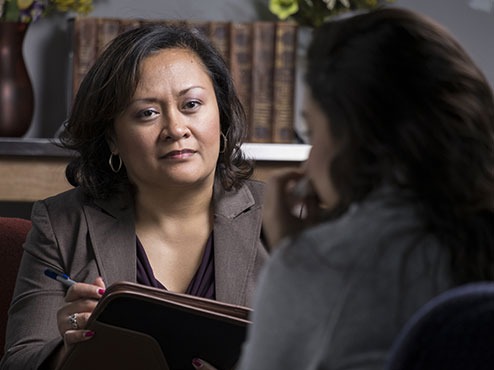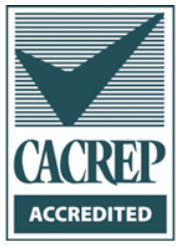As the severity of the COVID-19 pandemic begins to ease, counseling professionals will find that they are needed more than ever before to help those struggling with addiction.
Earn your master’s in addiction counseling
The CACREP-accredited master’s in addiction counseling will train you to work with adults and adolescents experiencing one or more addictions (alcohol, prescription drugs or illicit drugs) in a variety of community settings, including addiction/recovery centers, community mental health centers, hospitals and employee assistance programs. You’ll be able to diagnose and treat mental and emotional disorders, including addiction, using a variety of interventions and methods.
You will be eligible to become a Licensed Professional Counselor (LPC) and get the 180 hours of required addiction-specific coursework to become certified as an Advanced Alcohol and Drug Counselor (CAADC).
On this path to a career helping others, you’ll learn about addiction theories, biological factors and co-occurring disorders.

Credits required:
60 credits
Cost per credit:
$957/credit
Time to degree:
As few as 30 months
Delivery:
On campus
Addictions Counseling degree curriculum
You must take a three-course sequence for the Addictions Counseling track in addition to the LPC degree core courses. The courses cover counseling theories, the biological basis for addiction, and counseling clients who have substance abuse and psychiatric disorders.
Quick Facts
- Accumulate 180 hours of addiction-specific coursework needed for Advanced Alcohol and Drug Counselor (CAADC) certification
- Complete a graduate assistantship if desired

Alternate degree completion option
Accelerated
Fast track your way into this master’s program by taking graduate courses as a Carlow undergraduate student. Course credits count toward both degrees. Apply for the accelerated option after your sophomore year.
Career opportunities for Addiction Counselors
Employment of substance abuse and mental health counselors is projected to grow 25% from 2019 to 2029, according to the U.S. Bureau of Labor Statistics.
▸ View the Professional Licensure Disclosure for this program.
Accreditation

The Council for Accreditation of Counseling and Related Educational Programs (CACREP), a specialized accrediting body recognized by the Council for Higher Education Accreditation (CHEA), has granted accreditation to the following programs in the Department of Psychology, Counseling, and Criminology at Carlow University: Addictions Counseling and Clinical Mental Health Counseling through 2029.
The Professional Counseling Program emphasizes high standards of professional competence. The program is committed to its stated mission through ongoing accreditations by the Middle States Commission on Higher Education and the Council for Accreditation of Counseling and Related Educational Programs (CACREP). We emphasize ethical practice and keep current with state and national standards for certification and licensure for practice in clinical practice environments. In addition, we engage in ongoing program development and refinement based on accrediting bodies’ and licensure boards’ developments and recommendations, as well as sensitivity to licensure requirements, and legal and ethical issues.
Additional program information:
- Learn about the program (program description, annual report, mission statements and program objectives)
- Graduate statistics (NCE pass rates, completion rates and job placement rates)
Admission requirements and application process
If you are interested in pursuing a career in Professional Counseling by providing individual and group counseling, you can apply for free online. The graduate program admissions process happens on a rolling basis. Our students have undergraduate degrees in a wide array of disciplines from psychology, human services, social work, or other related majors to majors outside of the helping professions.
Apply by
November 1 or April 1
Start terms:
Fall & Spring
Requirements
- Baccalaureate degree from an accredited institution
- Cumulative GPA of 3.0 or higher. A GPA below 3.0 may be reviewed on a case-by-case basis if there is relevant evidence of work history in the helping field, and/or strong grades in upper-level courses (psychology, human services, social work, or other related majors).
- Evidence of work and/or volunteer experience in a helping field
- Evidence of graduate level writing skills necessary for success in a graduate program
- Ability to perform all the program’s essential standards required to practice as a professional counselor
- Ability to demonstrate professional dispositions and behaviors
Process
- Official transcripts from all degree-granting institutions you have attended. Transcripts must be sent directly to the Carlow from the institution(s).
- A written professional essay describing your professional career goals, strengths, and skills that will contribute to your success in a graduate counseling program. Additionally, discuss how you incorporate social justice and diversity in your work. If your GPAs is below 3.0, also include the factors that impacted your GPA. The essay must demonstrate evidence of graduate level writing skills. (2-page limit).
- Current resume or curriculum vitae highlighting education and professional experiences in counseling and/or related field.
- Two letters of recommendation (one from faculty member/academic source & one from employer/volunteer supervisor) that address your professional accomplishments, leadership potential, and ability to succeed in graduate-level work. The references should not be related to the applicant.
- GRE/GMAT scores are not required for admission
Transfer students can transfer up to 9 credits earned at a CACREP-accredited program. International students can find more information on our International Admissions page.
The Professional Counseling Program’s application deadline for Fall semester is April 1st and November 1st for the Spring semester. We will continue to accept applications for review beyond those deadlines; however, preference will be given to those that applied by the designed deadlines. The preferred deadline for full consideration of graduate assistantship opportunities is February 1st.
Once your completed application is received, the program faculty will review your application materials and the selected applicants will be scheduled for an interview. Incomplete applications will not be reviewed. Admission decisions include regular, provisional, and conditional admission to the program.

A program with relevant specializations
Chelsie Crate ’23 chose Carlow for graduate school because she could specialize in substance abuse in the Professional Counseling program, something she hadn’t seen at other institutions. “Carlow received its CACREP accreditation shortly before I began the program, which is a major plus in the counseling realm. Perhaps the most influential factor in my decision was the passion and dedication portrayed by the faculty.”
Professional Counseling faculty

Aniela Scanlon, PhD, LPC, NCC, ACS Assistant Professor, Professional Counseling
Contact Admissions
If you are interested in this graduate program, our Admissions team is available to help you with the next steps, including scheduling an on-campus visit or attending an upcoming event.



